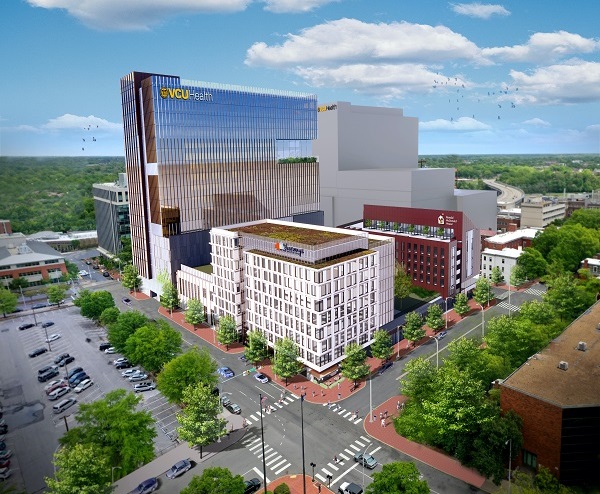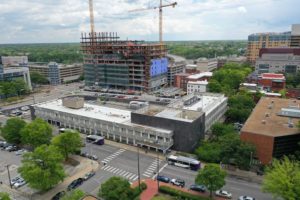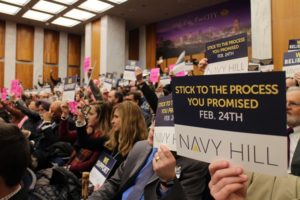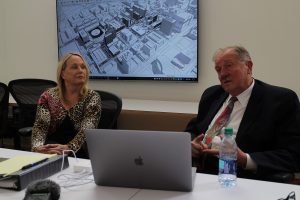
A rendering of the proposed office tower and complex that would replace the Public Safety Building. (Courtesy Capital City Partners)
As the public weighs in on what they want to see developed on city-owned properties around the Richmond Coliseum, city administrators are moving forward with a process to consider a recent proposal from a developer for one of those properties.
City Council this week approved a surplus property designation for the Public Safety Building at 500 N. 10th St., clearing the way for the city to solicit proposals for that site, and to entertain the proposal received last month through an unsolicited offer from Capital City Partners, the development team behind the former Navy Hill project.

The Public Safety Building as viewed along Ninth Street, with the under-construction VCU Health outpatient building looming behind it. (Capital City Partners)
City code requires that the city put out a formal request for proposals before council can act on an unsolicited offer. But in council’s meeting Monday, administrators said they want authorization from council to forgo an RFP and enter directly into negotiations with CCP.
Sharon Ebert, the city’s deputy chief administrative officer for economic and community development, said administrators were prepared to move forward with an RFP through an introduction to a council committee next month.
“However,” Ebert said, “we would also wish the council could allow us to negotiate instead with the Capital City Partners that has an unsolicited offer pending on this site, as we believe that this is a valid offer.”
Leonard Sledge, the city’s economic development director, also advocated for moving forward with negotiations with CCP, which is offering to purchase the 3-acre site and replace the Public Safety Building with a $350 million mixed-use development with a 20-story, VCU Health-anchored tower.
Sledge said the city has completed its appraisals of that property and others that initially were included in the surplus property designation. The other properties were removed from that designation process after council members complained that it would precede a desired small area plan for the Coliseum area that’s being developed as part of the city’s Richmond 300 master planning effort.
Sledge also cited a survey tied to that effort that showed a positive reception to the CCP proposal. Initial response to that survey, gauged during a Richmond 300 virtual summit last week, showed about 85 percent of roughly 180 respondents considered the proposal an appropriate use for the site.
Noting other components of the proposal, including that it would be privately owned and therefore taxable by the city, Sledge said, “For those reasons, we are of the opinion that it is a good use and we should move forward to negotiate with Capital City Partners.”
Survey ends Monday
Nearly 500 more responses to the survey have been submitted since that summit, which was held June 15, when the survey went live. Results from those responses have not been released, as the survey remains live through Monday until midnight. The survey is posted on the Richmond 300 website and can be taken here.
The survey is meant to gauge what the public wants to see in terms of development of the Coliseum area, including the shuttered arena and other city-controlled properties once eyed for Navy Hill. It’s also meant to contribute to, along with the summit and additional meetings over the summer, the public engagement that a council majority requested before voting down Navy Hill in February.

Attendees at a Navy Hill public hearing raised signs for and against the project ahead of council’s vote. (BizSense file)
A resolution adopted the previous month called for “robust, citywide public input,” as well as appraisals of the properties and the area plan, before proceeding with a new RFP process. In Monday’s meeting, councilmember Kristen Larson asked Sledge why council had not received a copy of the appraisals, which were completed earlier this month.
Sledge replied that the city doesn’t want “to negotiate against ourselves” and said that sharing the appraisals could compromise the city’s negotiating power. He said providing council with a copy “could be a race to the bottom, by disclosing what our appraisal is at this point.”
Larson maintained that council had requested the appraisals before CCP’s proposal was on the table.
“Putting this proposal on a shelf for a minute, we requested this per a resolution as a majority of council, and we’ve been asking for it for several months now,” Larson said. “To now say you have it, and I understand you’re not sure if you’re going to give it to us or not, but that’s incredibly frustrating.”
Councilmember Ellen Robertson defended the decision, which she described as giving the city an advantage going into negotiations. She added that the outcome of those negotiations would come back to council for its approval.
Developer’s appraisal shaped offer
CCP’s proposal was based on an appraisal by commercial real estate firm CBRE. That appraisal put the land value of the 3-acre Public Safety Building site, once it’s made “shovel-ready” after the existing structure is demolished, at $8.5 million.
Because CCP’s offer assumes it bearing the costs of demolition and infrastructure improvements to ready the site and extend Clay Street between Ninth and 10th streets, estimated values of that work were deducted from the $8.5 million land value, resulting in CCP’s proposed purchase price of about $3.17 million.
Totaling 545,000 square feet, CCP’s proposal is a variation of what was known as “Block D” in the Navy Hill project, but with the taller tower that would accommodate an additional 150,000 square feet of Class A office space. While VCU Health is signed on as a primary tenant, the additional office space would be built on spec with a goal of attracting new business to Richmond.
The rest of the tower, totaling 300,000 square feet, would house administrative and office space for VCU Health designed to support the Adult Outpatient Pavilion building under construction next door, as well as the health system’s nearby Children’s Hospital Pavilion.
An adjacent nine-story building would house house new facilities for local nonprofit The Doorways, and a comparable-height building would house facilities for Ronald McDonald House Charities of Richmond. The smaller buildings also would house a new child development space for VCU Health. Sledge has said the move likely would result in The Doorways selling its current building at 612 E. Marshall St.
CCP is led by Michael Hallmark of Richmond-based Future Cities and Susan Eastridge of Fairfax-based Concord Eastridge, who were enlisted to design and develop Navy Hill by local group NH District Corp.
In Monday’s meeting, Sledge stressed that the CCP project would be privately owned and therefore taxable by the city, contributing revenue that could be put toward city services. He and others reiterated that the city does not have to accept CCP’s project as proposed, and he said council would be apprised of negotiations accordingly.
Councilmember Kim Gray questioned language in the proposal concerning infrastructure costs and how the sale price could change if those costs exceed certain amounts or if the city opted to bear the costs. She also suggested that the city consider a land lease over a sale.
Noting that state law prevents the city from expanding its real estate tax base through boundary annexation, Gray said, “I think it’s important to consider long-term land leases as a possibility as opposed to a sale. They act as a de facto sale, but they offer us more options for future generations.”
More summits scheduled
Meanwhile, the Richmond 300 process continues to play out, with city planners rolling out and highlighting aspects of the draft plan in the summits, recordings of which are posted on its website.
A second Coliseum-area summit is scheduled July 14, the day after the public comment period for the draft plan ends on July 13. A third Coliseum-area summit is scheduled Aug. 10.

A rendering of the proposed office tower and complex that would replace the Public Safety Building. (Courtesy Capital City Partners)
As the public weighs in on what they want to see developed on city-owned properties around the Richmond Coliseum, city administrators are moving forward with a process to consider a recent proposal from a developer for one of those properties.
City Council this week approved a surplus property designation for the Public Safety Building at 500 N. 10th St., clearing the way for the city to solicit proposals for that site, and to entertain the proposal received last month through an unsolicited offer from Capital City Partners, the development team behind the former Navy Hill project.

The Public Safety Building as viewed along Ninth Street, with the under-construction VCU Health outpatient building looming behind it. (Capital City Partners)
City code requires that the city put out a formal request for proposals before council can act on an unsolicited offer. But in council’s meeting Monday, administrators said they want authorization from council to forgo an RFP and enter directly into negotiations with CCP.
Sharon Ebert, the city’s deputy chief administrative officer for economic and community development, said administrators were prepared to move forward with an RFP through an introduction to a council committee next month.
“However,” Ebert said, “we would also wish the council could allow us to negotiate instead with the Capital City Partners that has an unsolicited offer pending on this site, as we believe that this is a valid offer.”
Leonard Sledge, the city’s economic development director, also advocated for moving forward with negotiations with CCP, which is offering to purchase the 3-acre site and replace the Public Safety Building with a $350 million mixed-use development with a 20-story, VCU Health-anchored tower.
Sledge said the city has completed its appraisals of that property and others that initially were included in the surplus property designation. The other properties were removed from that designation process after council members complained that it would precede a desired small area plan for the Coliseum area that’s being developed as part of the city’s Richmond 300 master planning effort.
Sledge also cited a survey tied to that effort that showed a positive reception to the CCP proposal. Initial response to that survey, gauged during a Richmond 300 virtual summit last week, showed about 85 percent of roughly 180 respondents considered the proposal an appropriate use for the site.
Noting other components of the proposal, including that it would be privately owned and therefore taxable by the city, Sledge said, “For those reasons, we are of the opinion that it is a good use and we should move forward to negotiate with Capital City Partners.”
Survey ends Monday
Nearly 500 more responses to the survey have been submitted since that summit, which was held June 15, when the survey went live. Results from those responses have not been released, as the survey remains live through Monday until midnight. The survey is posted on the Richmond 300 website and can be taken here.
The survey is meant to gauge what the public wants to see in terms of development of the Coliseum area, including the shuttered arena and other city-controlled properties once eyed for Navy Hill. It’s also meant to contribute to, along with the summit and additional meetings over the summer, the public engagement that a council majority requested before voting down Navy Hill in February.

Attendees at a Navy Hill public hearing raised signs for and against the project ahead of council’s vote. (BizSense file)
A resolution adopted the previous month called for “robust, citywide public input,” as well as appraisals of the properties and the area plan, before proceeding with a new RFP process. In Monday’s meeting, councilmember Kristen Larson asked Sledge why council had not received a copy of the appraisals, which were completed earlier this month.
Sledge replied that the city doesn’t want “to negotiate against ourselves” and said that sharing the appraisals could compromise the city’s negotiating power. He said providing council with a copy “could be a race to the bottom, by disclosing what our appraisal is at this point.”
Larson maintained that council had requested the appraisals before CCP’s proposal was on the table.
“Putting this proposal on a shelf for a minute, we requested this per a resolution as a majority of council, and we’ve been asking for it for several months now,” Larson said. “To now say you have it, and I understand you’re not sure if you’re going to give it to us or not, but that’s incredibly frustrating.”
Councilmember Ellen Robertson defended the decision, which she described as giving the city an advantage going into negotiations. She added that the outcome of those negotiations would come back to council for its approval.
Developer’s appraisal shaped offer
CCP’s proposal was based on an appraisal by commercial real estate firm CBRE. That appraisal put the land value of the 3-acre Public Safety Building site, once it’s made “shovel-ready” after the existing structure is demolished, at $8.5 million.
Because CCP’s offer assumes it bearing the costs of demolition and infrastructure improvements to ready the site and extend Clay Street between Ninth and 10th streets, estimated values of that work were deducted from the $8.5 million land value, resulting in CCP’s proposed purchase price of about $3.17 million.
Totaling 545,000 square feet, CCP’s proposal is a variation of what was known as “Block D” in the Navy Hill project, but with the taller tower that would accommodate an additional 150,000 square feet of Class A office space. While VCU Health is signed on as a primary tenant, the additional office space would be built on spec with a goal of attracting new business to Richmond.
The rest of the tower, totaling 300,000 square feet, would house administrative and office space for VCU Health designed to support the Adult Outpatient Pavilion building under construction next door, as well as the health system’s nearby Children’s Hospital Pavilion.
An adjacent nine-story building would house house new facilities for local nonprofit The Doorways, and a comparable-height building would house facilities for Ronald McDonald House Charities of Richmond. The smaller buildings also would house a new child development space for VCU Health. Sledge has said the move likely would result in The Doorways selling its current building at 612 E. Marshall St.
CCP is led by Michael Hallmark of Richmond-based Future Cities and Susan Eastridge of Fairfax-based Concord Eastridge, who were enlisted to design and develop Navy Hill by local group NH District Corp.
In Monday’s meeting, Sledge stressed that the CCP project would be privately owned and therefore taxable by the city, contributing revenue that could be put toward city services. He and others reiterated that the city does not have to accept CCP’s project as proposed, and he said council would be apprised of negotiations accordingly.
Councilmember Kim Gray questioned language in the proposal concerning infrastructure costs and how the sale price could change if those costs exceed certain amounts or if the city opted to bear the costs. She also suggested that the city consider a land lease over a sale.
Noting that state law prevents the city from expanding its real estate tax base through boundary annexation, Gray said, “I think it’s important to consider long-term land leases as a possibility as opposed to a sale. They act as a de facto sale, but they offer us more options for future generations.”
More summits scheduled
Meanwhile, the Richmond 300 process continues to play out, with city planners rolling out and highlighting aspects of the draft plan in the summits, recordings of which are posted on its website.
A second Coliseum-area summit is scheduled July 14, the day after the public comment period for the draft plan ends on July 13. A third Coliseum-area summit is scheduled Aug. 10.




Random point, but don’t the Doorways and Ronald McDonald House do the same thing —offer temporary housing to families who have loved ones undergoing treatment at MCV? Why can’t these two non-profits merge and put more of their administration costs towards services?
THIS is what I am talking about! All this dumb complicated stuff with a bunch of giveaways that the Virtue Signaling Mayor can say he negotiated for was just going to run the risk of putting the city in financial jeopardy. THIS sort of thing (and I am not saying that this would either be the Best Use or the Best financial deal for the city, I can’t know either of those things) is what intelligent cities do — “we have valuable real estate; private entities will want to buy it from us and build expensive improvements that we can… Read more »
The deal boasts that the development will be taxable because it will be privately owned and VCU will only be the lead tenant. But we need legal assurances that the developer won’t just sell the property to VCU a few years down the road and thus taken off the tax rolls then. We need some kind of solution that eliminates that risk. I’m not certain what type of mechanism is appropriate for that. Whether it be a land lease or some kind of covenant in the deal…
Shawn Harper is incorrect with regard to a failure of the project. In the event of a default the lender, not the City of Richmond, will become the owner of the property.
With regard to Michelle Reynolds comment regarding the sale of the property to VCU or the Commonwealth of Virginia, which would eliminate the real estate tax revenue, the City should require a restrictive covenant for a period of years (ie; 20) that prevents the Owner from selling to any entity that would remove the property from the tax rolls.
Problem solved !